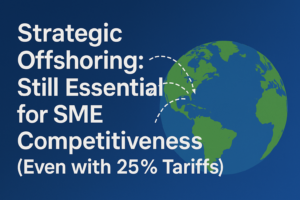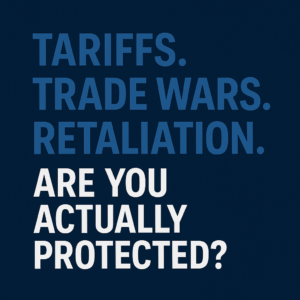
Geopolitical stability is a critical factor influencing manufacturing decisions, particularly when considering offshoring to countries like China and Vietnam. Here’s an in-depth look at how the geopolitical landscapes of these two countries affect manufacturing strategies.
Geopolitical Stability in China
China’s geopolitical environment has become increasingly complex, impacting its attractiveness as a manufacturing hub. Several key factors contribute to this dynamic:
Rising Geopolitical Tensions
China’s assertive foreign policy, particularly concerning Taiwan, has heightened geopolitical risks. The potential for military action to reintegrate Taiwan poses significant uncertainties for manufacturers reliant on Chinese supply chains. Additionally, the ongoing trade tensions with the United States and other Western nations have led to increased tariffs and regulatory hurdles, complicating business operations.
Economic Slowdown
China is experiencing an economic slowdown, marked by high youth unemployment and a struggling property sector. This economic instability can deter foreign investment and disrupt manufacturing operations. The Chinese government’s focus on balancing economic development with national security further adds to the uncertainty, as policy shifts may impact business stability.
Regulatory and Compliance Challenges
China’s regulatory environment is becoming more stringent, with increased focus on data security and national security. Foreign companies must navigate complex laws and regulations, which can increase compliance costs and operational risks.
Geopolitical Stability in Vietnam
Vietnam presents a contrasting picture, offering both opportunities and challenges for manufacturers looking to diversify their operations away from China.
Favorable Geopolitical Position
Vietnam has benefited from the US-China trade war, attracting manufacturers seeking to mitigate geopolitical risks. The country’s strategic location and participation in regional trade agreements make it an appealing alternative for businesses aiming to diversify their supply chains.
Economic and Policy Stability
Vietnam’s government has actively promoted foreign direct investment (FDI) in high-tech manufacturing, offering incentives to attract global companies. Investments from major corporations like Intel, Samsung, and Apple highlight the country’s growing role in global value chains. However, the transition from low-tech to high-tech manufacturing is gradual and requires sustained policy support and infrastructure development.
Regulatory and Compliance Considerations
While Vietnam offers a more stable geopolitical environment compared to China, it is not without its challenges. The country has introduced new laws on intellectual property, competition, and data management, which can pose compliance risks for foreign firms. Additionally, rising labor costs and complex legal frameworks require careful navigation by businesses.
Strategic Implications for Manufacturing
Given the geopolitical landscapes of China and Vietnam, manufacturers must consider several strategic implications:
Diversification of Supply Chains
To mitigate geopolitical risks, companies are increasingly adopting a China+1 strategy, diversifying their manufacturing operations to include countries like Vietnam. This approach helps reduce dependency on a single market and enhances supply chain resilience.
Focus on Resilience and Reliability
Manufacturers are shifting from a “just-in-time” to a “just-in-case” supply chain strategy, prioritizing reliability and resilience over cost efficiency. This involves building robust supply chains that can withstand geopolitical disruptions.
Due Diligence and Compliance
Thorough due diligence is essential when expanding operations to new markets. Companies must understand the local regulatory environment, labor laws, and compliance requirements to avoid potential pitfalls and ensure smooth operations.
Summary and Recommendations
Lessons Learned
- Geopolitical Risks: The geopolitical stability of a country significantly impacts its attractiveness as a manufacturing hub. Rising tensions in China and regulatory challenges in Vietnam must be carefully considered.
- Supply Chain Diversification: Adopting a diversified supply chain strategy, such as China+1, can mitigate risks and enhance resilience.
- Regulatory Compliance: Understanding and navigating local regulations and compliance requirements are crucial for successful manufacturing operations.
Recommended Reading
- “The Great Rewiring: How Global Supply Chains Are Reacting to Today’s Geopolitics” by CSIS, Center for Strategic and International Studies.
- “Can Vietnam Replace China? No, But it was Never Supposed to Either” by Pritesh Samuel, Vietnam Briefing.
“Finding and managing high-quality high-savings offshore manufacturing for small to medium-sized North American businesses can be confusing and risky. At REDUx we partner with you to manage the process end-to-end with no upfront cost, instead, sharing only 20% of the net ongoing savings. Contact us at www.REDUxEngineering.com today!
Subscribe to our Social Media platforms for ongoing resources and information:
- YouTube: https://www.youtube.com/@REDUxEngineering-Bottomline
- Instagram: https://www.instagram.com/reduxengineering/
- LinkedIn: https://www.linkedin.com/company/redux-engineering/about/?viewAsMember=true
- FaceBook: https://www.facebook.com/profile.php?id=61559808581134“
#GeopoliticalStability #ChinaManufacturing #VietnamManufacturing #SupplyChain #ManufacturingStrategy #Offshoring #GlobalTrade #EconomicResilience #RegulatoryCompliance #ChinaPlusOne
#QualityControl #VietnamManufacturing #Manufacturing2024 #OffshoreManufacturing #REDUxEngineering #QualityAssurance #ManufacturingTips #TechInManufacturing #AuditProcess #InspectionProcess






